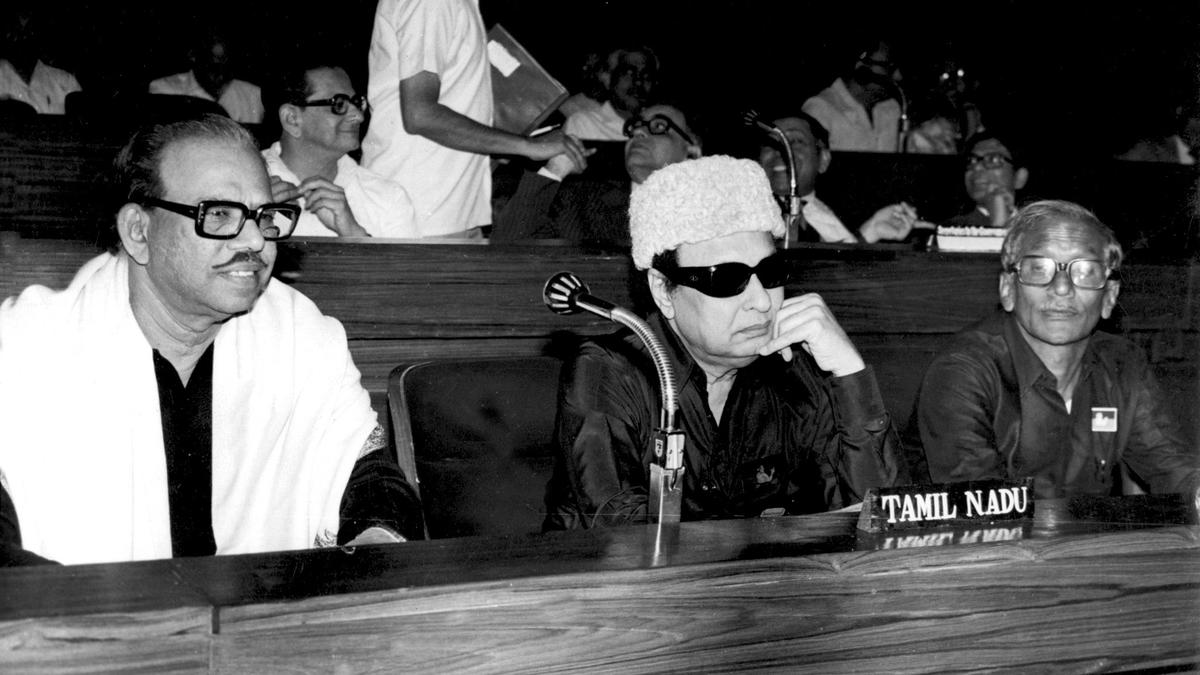It was the early months of the second term of Chief Minister M.G. Ramachandran, the only one to have returned to power in a stunning fashion in June 1980, having been dismissed four months earlier along with eight other Chief Ministers. And in a drastic action, his government promulgated an ordinance on the night of November 13, 1980, and at one stroke removed traditional Village Officers (VOs), numbering about 24,000. More than anything else, the manner in which the government went ahead with the decision was what stunned the village headmen and karnams.
At many places, there were reports of the government having used force to make the VOs hand over the account books and records immediately after the ordinance was promulgated. The Supreme Court, while hearing a case in this regard in December 1980, had “deprecated the high-handed manner” of the government, according to a report of The Hindu on December 19, 1980. This episode would perhaps look like a rehearsal of the dismissal of over 1.5 lakh government employees and teachers in July 2003 when MGR’s political inheritor Jayalalithaa was the Chief Minister.
Bill to replace ordinance
In February 1981, the Assembly adopted a Bill to replace the ordinance, prompting DMK and Congress legislators to stage a walkout. The then Revenue Minister, S.D. Somasundaram, one of the key players behind the decision, assured the House that the ousted officers would be paid compensation, which would total ₹5 crore, though there was no provision for it in the Bill. He defended the decision, citing the suggestions of the Supreme Court and the Administrative Reforms Commission, according to a report of The Hindu on March 1, 1981. The next day, the Bill received the assent of Governor Sadiq Ali.
A year later, in the light of the Supreme Court’s judgment, the State government decided to absorb those who had the education qualification of a pass in the secondary school leaving certificate examination. This would benefit 4,000-5,000 persons. The age restriction would be relaxed and there was no need for them to sit for a test of the Tamil Nadu Public Service Commission.
A ‘landmark’ decision
According to former Chief Secretary A. Padmanaban, this was a “landmark” decision. The institution of hereditary VOs, as pointed out by Mr. Padmanaban in his memoir My Days and Times, was “the old feudal system”. In its place, open recruitment was made through a routine test. “Due consideration” was given to candidates of the Scheduled Castes (SCs), the Scheduled Tribes (STs), and the Backward Classes. “This democratisation process has abolished the village tyranny and age-old prejudices,” wrote the civil servant who, as the Commissioner of Revenue Administration (CRA), oversaw the execution of the government decision during the eventful period. Mr. Padmanaban served as the Chief Secretary for more than one-and-a-half years since July 1986.
Today, the consensus even among those senior officials, who are not enamoured of the current crop of Village Administrative Officers (VAOs), is that but for the abolition, SCs and OBCs having become VAOs in a large number “was unimaginable under the previous system”. Another former Chief Secretary called the decision “revolutionary”. One more retired Chief Secretary, known for perceptive observation of life, recalled that in several cases, the ousted officers were found to be creating trouble between two groups of people. “Many were believed to have empathized with the Vivasayigal Sangam [headed by Narayanaswamy Naidu who led an agitation in 1978],” R. Kannan, diplomat-turned-historian, said in his biography of MGR.
Chief Secretary replaced
An old official of the State Revenue Service, who observed the execution of the decision at close quarters, says the then Chief Secretary, V. Karthikeyan, had differed with the position of the government and recorded his opinion on the file. Some months later, he was replaced with K. Diraviam. However, even now, there is a debate on the subject. For instance, farmers feel the absence of the VOs, since replaced with VAOs.
S. Nallasamy, leader of the Federation of Tamil Nadu Agriculturists Associations, from Erode points out, “In the old system, the VOs — village headman, karnam, talaiyari, vetti, nirganti, and additional headman — hailed from their respective villages. So, they knew everything about their areas and residents. But VAOs, whose job is transferable and full time, are not as knowledgeable as the karnams”. He adds, “[instead of their respective villages], all the VAOs reside in the city of Erode.”
‘Honourable men’
Mr. Nallasamy, who has been demanding that the State government conduct a study of the impact of the two “radical decisions” of the MGR government, is not oblivious to the criticism levelled against the part-time VOs: they had acted like “feudal lords”. However, “by and large, they were honourable men”, he asserts, adding that a majority of the current officers were from “upper castes”.
Before the abolition, the MGR government’s another drastic measure was to do away with the Board of Revenue with effect from November 5, 1980. A few months earlier, the bicameral legislature adopted a piece of legislation to this effect. Regarded in certain quarters, including politicians of the day, as a “super government”, the Board had three senior IAS officers as members who could not be otherwise accommodated as the Chief Secretary and who wielded enormous power and authority over the Collectors. Under the new system, there would be five commissioners, each in charge of revenue administration, land administration, land reforms, transport and commercial taxes, reported The Hindu on August 13, 1980.
The merits and demerits of the abolition of the Board has remained a matter of discussion among administrators, but it is the ouster of the hereditary VOs that is being deliberated among the people. Notwithstanding many positive features of the MGR government’s action, the present popular perception is not favourable to the VAOs. This only highlights the need for drastically reducing, if possible eliminating, the scope for interface between the people and the VAOs to weed out corruption.
Published – February 13, 2025 11:55 pm IST
